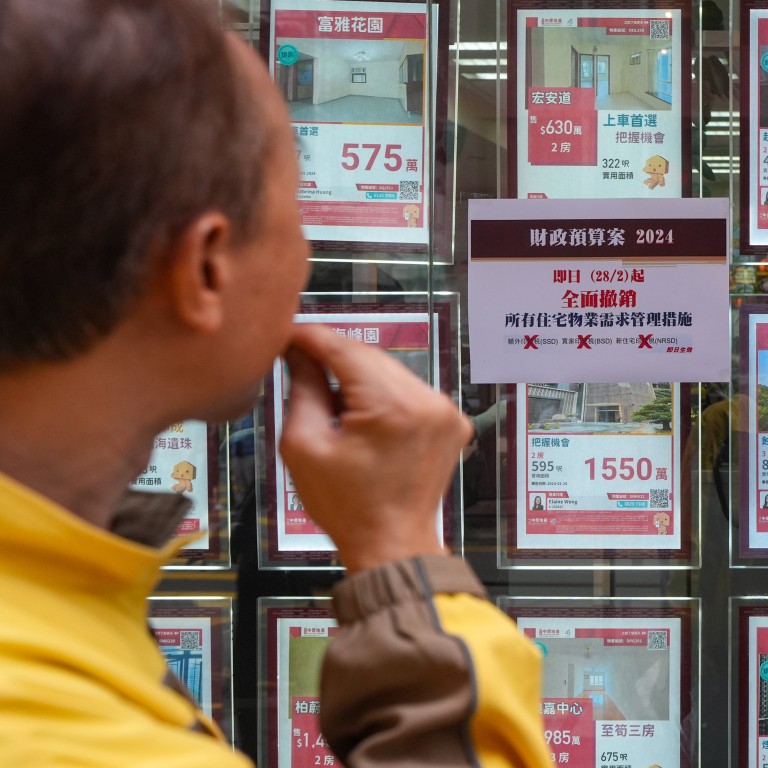
Scrapping Hong Kong property curbs will not lead to overheated market or encourage speculation, government says
- Financial Secretary Paul Chan says market conditions have changed since cooling measures were introduced about a decade ago
- Chan says the reduction in property restrictions and taxation will boost confidence in market and increase transactions
All restrictions on Hong Kong property sales were scrapped from Wednesday after a chorus of calls from the real estate sector and a nine months in a row fall in home prices and authorities reassured the public the move was unlikely to heat up the market and drive speculation.
The removal of the decade-old property cooling measures included the Buyer’s Stamp Duty designed to target non-permanent residents, the New Residential Stamp Duty for second-time purchasers, as well as a Special Stamp Duty aimed at homeowners who resold their property within two years.
The news came four months after the government lifted some property market cooling measures last October, which included a 50 per cent reduction in stamp duties paid by non-locals, companies and homebuyers who were not first-time buyers.
Financial Secretary Paul Chan Mo-po said the market had changed since cooling measures were introduced in 2010, when private flat supply failed to meet demand and property prices soared.

“We have considered the current market situation and the economy,” Chan said after the budget statement.
“At present, the flat supply and demand is relatively balanced. We do not need the demand-side management measures any more. The market can trade freely following the relaxation.”
He added that the city was expected to bring around 109,000 private flats to the market over the next three to four years.
The Hong Kong Monetary Authority on Wednesday also relaxed its rules and loosened off mortgage lending requirements for homebuyers, properties for rent and offices.
Chan said the reduction in property restrictions would boost people’s confidence in the market.
He added that the government expected the volume of transactions to increase, but did not give an estimate on how much the market might grow.
A government insider said it would be difficult to estimate the effect the removal of restrictions would have on transactions and property prices.
“There are many factors affecting the property price, including the supply and demand, confidence in the market and the macroeconomic situation,” the source explained.
Hong Kong’s finance chief set to remove some property cooling measures
The insider added the chances of large-scale, short-term speculation because of the changes were low.
“Following the adjustment last October, there has been no sign of market exuberance as a result of the relaxation,” the source said.
Hong Kong’s lived-in home prices fell for the ninth straight month in January, down 1.57 per cent, which dragged the city’s official house price index down to a level last seen more than seven years ago.
The source added that monthly residential property transactions rose from around 2,100 in October to around 3,500 in January, but remained well below the average of 4,370 a month in the first half of 2023.
The insider said the number of short-term resales made up 0.9 per cent of the total number of transactions last year – well below the 20 per cent recorded before the stamp duty designed to target those homeowners was introduced in 2010.
Just 0.8 per cent of property transactions were made by non-local individuals and non-local companies. The figure was lower than 4.5 per cent before the Buyer’s Stamp Duty was introduced in 2012.
Only 3 per cent of property sales to Hongkongers involved non-first-time buyers last year. The figure was also significantly lower than the 25 per cent recorded before the introduction of the New Residential Stamp Duty in 2016.
All buyers are subject to stamp duty of up to 4.25 per cent linked to the price of the property after the removal of the curbs.
The source did not give an estimate of the effect on revenue after the changes, but that it would depend on the transaction volume.
Wealthy and travellers targeted by Hong Kong’ new revenue-boosting measures
The source said the government made an average annual income of HK$9.4 billion (US$1.2 billion) generated by the property restrictions between 2020 and 2023.
The source added that the administration would continue to monitor market conditions and impose fresh restrictions if required.
The Real Estate Developers Association of Hong Kong said the scrapping of property curbs could help boost the city’s economy.
“It will help the property market to recover and develop healthily, revive economic growth momentum and restore confidence in Hong Kong’s economic prospects among citizens and international investors,” the association added.

Diamond Shea Hing-wan, the chairman of the Hong Kong Owners Club, a property owners’ association, and who has more than two decades of property investment experience, said he would not buy additional properties, despite being benefited by the changes.
“I will only consider,” he said. “Property prices are still falling – how can I feel confident entering the market?”
Ho Lok-sang, director and research professor of the Pan Sutong Shanghai-Hong Kong Economic Policy Research Institute at Lingnan University, predicted the abolition of the restrictions would provide a mild boost.
“Property prices might not soar,” he said. “While the demand will increase, the supply is also expected to rise.
“But one thing is certain. The number of transactions will increase, and that would move the market.”

